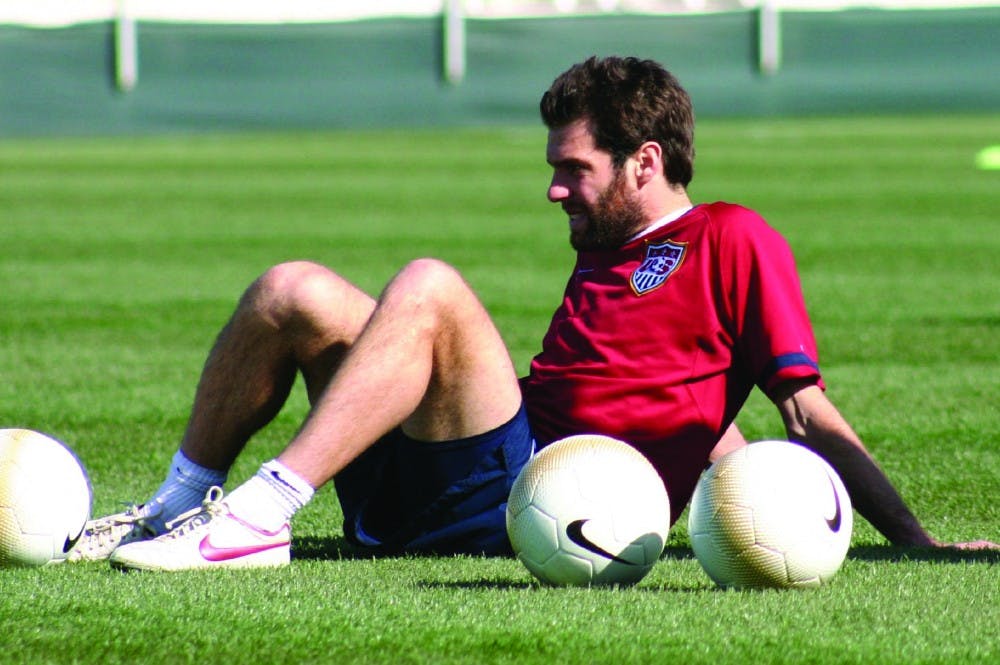Few players in the history of the Virginia men's soccer program have been as impressive as Ben Olsen. In his three-year career as a Cavalier, Olsen tallied 34 goals, 41 assists and 109 total points before foregoing his senior year to play professionally. Olsen currently shares second place on Virginia's all-time list for most points in a season with 54, holds sixth place for goals in a season with 19, third and fifth for assists in a season with 17 and 16, respectively, and third for career assists with 41. He was also named the Soccer America Collegiate Player of the Year in 1997.
Olsen joined D.C. United in 1998 and was subsequently named the MLS Rookie of the Year that season, establishing himself as a valuable asset on the right wing. Throughout his 10-year career with D.C. United, Olsen won two MLS Championships, was named the MLS Championship Game's most valuable player in 1999, and earned the title of MLS All-Star twice.
Olsen has also represented the USA at the international level, appearing in the 2006 World Cup.
After retiring in October of 2009, Olsen stepped in as D.C. United's interim coach in August 2010 and was officially named head coach in Nov. 2010.\nEarlier this month, he shared his thoughts with The Cavalier Daily.
What made you want to play at Virginia?\nIt was a team that just came off four national championships. I'd be lying if I said that didn't play a role in why I went there. They were a very successful team to say the least, and I had a previous relationship with Bruce Arena - he was someone I was very comfortable with. He coached me when I was 14 to 15 years old with the regional team and I liked his style of coaching, and I remember fondly both the trainings and the way he dealt with players. You combine that with the success he had and the team's success, and you add into that a great institution, and it was a no-brainer.
What's your best memory from your playing days at Virginia?\nMost of my memories at U.Va. are sports memories. I was fortunate enough to be on some wonderful and talented teams. We didn't win any national championships, but we went to two Final Fours and two ACC Championships. Those memories stand out at the school.
What was the most important lesson you took away from Virginia and your career there?\nCollege is a strange time in a lot of ways. I grew up in a small town up north and it was a different culture at U.Va. than I was used to. It opened my eyes to a different area of the country, meeting new people from around the country. It was a good experience for me. I look back on those years very fondly, both being a part of a school and being a part of some great teams.
Do you still follow Virginia soccer?\nIn the business I'm in now, I have no choice but to follow them. They are still one of the premier programs in the country and they produce very good players. Not to mention, I have some personal ties there so I'm secretly rooting for them.
Is it awkward when you're coaching older players you used to play with?\nI don't know if 'awkward' is the word. It's certainly interesting, the dynamic of coaching guys you've played with and fought with. In my head, it was something I didn't know how it would play out when I made the transition to coach. However, it's been pretty seamless. I try to treat all my players with respect whether I played with them or not and hold them all accountable. Fortunately the guys I have played with have respect for my role and did not make that a difficult transition. I told guys when I first took the job that my first priority is winning games for this organization. I'll have to make decisions according to that. Whether I've played with you, or we're friends, or our wives are friends, that's my main goal here; that's my job.
\n
What is the biggest challenge in transition from player to coach?\nYou go from being very well-versed in your job to beginning again. The subject is similar - playing and coaching. It's still soccer, but there's a lot more to coaching than the game itself: the managing, organizing of the staff. The focus on one particular job is very consuming. As a player it's not so consuming. You go to training, you do your job; then the rest of the day is yours. Now my mind races much more and I'm consumed by my job much more than as I was as a player.
You've added a lot of young defenders over the offseason, and you also lost your senior leader Jaime Moreno. How will this youth affect the D.C. United squad and your strategy? Do you fear a lack of leadership?\nWith youth comes energy. I'm not afraid to put youth out there and give them a chance. Do they need guidance? Absolutely. That guidance comes from myself, my staff. I've brought in some guys that I think show those qualities. There are guys that are 23 on this team that have been through it and can show these 17-, 18-year-olds how to approach this game in the right way. We've got guys that have leadership qualities. It'll be interesting to see who becomes those voices in the locker room.
-compiled by Jeremy Klitzman







